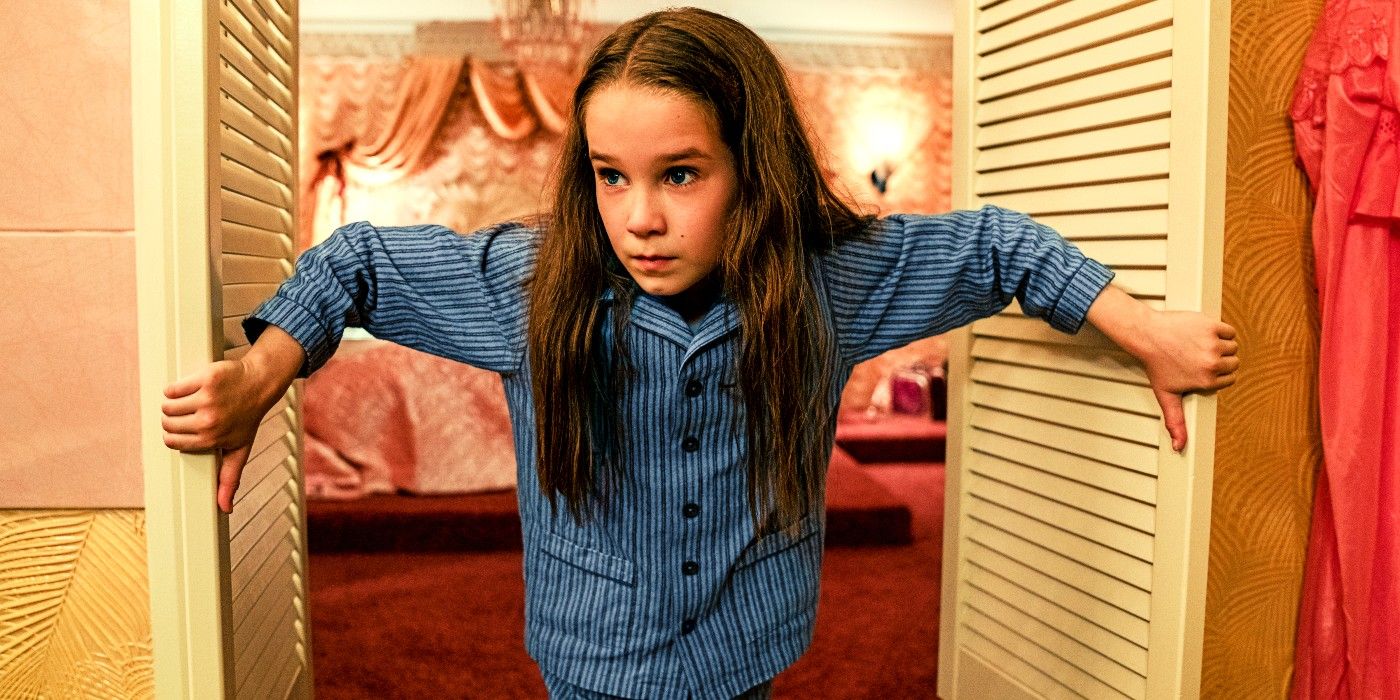Roald Dahl’s Matilda will be familiar to many who may have grown up on the 1996 film starring Mara Wilson, an enchanting film that adapted the English author’s story. That film (and the novel itself) were seemingly overshadowed by the debut of the musical adaptation that first premiered in 2010 before making its debut in London’s West End in 2011. The first film that is a part of Netflix’s overall deal with the Roald Dahl Story Company, Matilda the Musical is a strong start to what could prove to be a fruitful collaboration. The adaptation isn’t perfect (what stage-to-screen adaptation is?), but Matilda the Musical comes with a game cast, expertly staged musical numbers, and just a touch of magic that all the best musicals have.
Matilda the Musical follows its eponymous character, a precocious young girl with the worst parents in the world (played by Stephen Graham and Andrea Riseborough). Matilda Wormwood prefers to lose herself in books, something Mr. and Mrs. Wormwood can’t be bothered to care about. When Matilda is forced to attend school against her parent’s will, she meets teacher Miss Honey (Lashana Lynch) and the menacing Miss Trunchbull (Emma Thompson). When her school turns out to be a less-than-desirable place, Matilda must use her passion, imagination, and newfound friends and mentors to overcome all the obstacles in her life.
Matilda the Musical‘s stage iteration has received nothing short of critical acclaim during its various runs, including a high-profile stint on Broadway. Like the best musical adaptations, Netflix’s Matilda the Musical manages to keep the charm and delight of its stage production while expanding its scope only in the way a feature film could. Dahl’s original novel has gone through numerous forms, including the original film adaptation that Americanized much of the original story’s peculiar Britishness. Matilda the Musical meets both in the middle, retaining some of the changes it made to the novel (including removing characters like Matilda’s brother), and it largely works thanks to a few key components.
Thompson is excellent as Miss Trunchbull while nearly unrecognizable underneath all the prosthetics and militarized garb that makes her as terrifying as she is domineering. Lynch projects warmth as Miss Honey and gets a standout solo moment with “My House” that may come as a surprise to anyone more familiar with her steely performances in last year’s No Time to Die and this year’s The Woman King. It seems that no one is having more fun than Riseborough, though, who relishes every moment she’s onscreen as Mrs. Wormwood, dolled up brilliantly by the hair and makeup team. She opens the film with a scene where she refuses to acknowledge she’s pregnant with Matilda, setting a particularly high bar.
The true standouts, though, are Weir herself and the ensemble of children that back her up. Numbers like “Revolting Children” show off the cast of youngsters as they traipse around the grounds of the school with exacting choreography. Like Lynch, Weir projects warmth, but also confidence as she stands up to the adults in her life, most of which treat her (and the other children around them) with disregard at best and with pure contempt otherwise.
Matilda the Musical toes the line between this darkness and its charm and whimsy finely thanks to director Matthew Warchus and screenwriter Dennis Kelly. Warchus’ camerawork during some of the more kinetic numbers feels like the perfect example of the ways in which a movie musical can do what a stage show can not. Matilda the Musical feels like a worthy addition to the library of live-action Dahl adaptations and is a promising start to the collaboration between Netflix and the author’s Story Company. Its holiday release is also perfect timing as the film feels like the perfect comfort viewing for those who will be at home for the festivities.
Matilda the Musical will begin streaming on Netflix Sunday, December 25. The film is 122 minutes long and rated PG for thematic elements, exaggerated bullying and some language.



